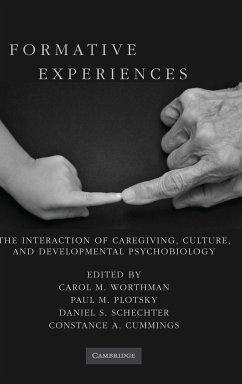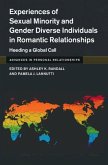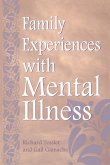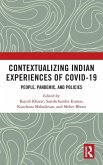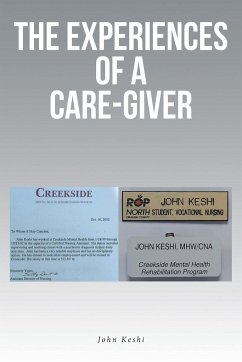Formative Experiences
Herausgeber: Worthman, Carol M.; Schechter, Daniel S.; Plotsky, Paul M.
Formative Experiences
Herausgeber: Worthman, Carol M.; Schechter, Daniel S.; Plotsky, Paul M.
- Gebundenes Buch
- Merkliste
- Auf die Merkliste
- Bewerten Bewerten
- Teilen
- Produkt teilen
- Produkterinnerung
- Produkterinnerung
Explores the formative effects of children's early life experiences, with an emphasis on interactions among neurodevelopmental, behavioral, and cultural dynamics.
Andere Kunden interessierten sich auch für
![Experiences of Sexual Minority and Gender Diverse Individuals in Romantic Relationships Experiences of Sexual Minority and Gender Diverse Individuals in Romantic Relationships]() Experiences of Sexual Minority and Gender Diverse Individuals in Romantic Relationships126,99 €
Experiences of Sexual Minority and Gender Diverse Individuals in Romantic Relationships126,99 €![Family Experiences with Mental Illness Family Experiences with Mental Illness]() Richard C. TesslerFamily Experiences with Mental Illness47,99 €
Richard C. TesslerFamily Experiences with Mental Illness47,99 €![Contextualizing Indian Experiences of Covid-19 Contextualizing Indian Experiences of Covid-19]() Contextualizing Indian Experiences of Covid-19196,99 €
Contextualizing Indian Experiences of Covid-19196,99 €![NEAR-DEATH EXPERIENCES NEAR-DEATH EXPERIENCES]() NandikaaNEAR-DEATH EXPERIENCES12,99 €
NandikaaNEAR-DEATH EXPERIENCES12,99 €![Mesmeric Experiences Mesmeric Experiences]() Spencer Timothy HallMesmeric Experiences33,99 €
Spencer Timothy HallMesmeric Experiences33,99 €![The Experiences of a Care-Giver The Experiences of a Care-Giver]() John KeshiThe Experiences of a Care-Giver18,99 €
John KeshiThe Experiences of a Care-Giver18,99 €![The Secret Self - Psychoanalytic Experiences In Life And Literature The Secret Self - Psychoanalytic Experiences In Life And Literature]() Theodor ReikThe Secret Self - Psychoanalytic Experiences In Life And Literature46,99 €
Theodor ReikThe Secret Self - Psychoanalytic Experiences In Life And Literature46,99 €-
-
-
Explores the formative effects of children's early life experiences, with an emphasis on interactions among neurodevelopmental, behavioral, and cultural dynamics.
Hinweis: Dieser Artikel kann nur an eine deutsche Lieferadresse ausgeliefert werden.
Hinweis: Dieser Artikel kann nur an eine deutsche Lieferadresse ausgeliefert werden.
Produktdetails
- Produktdetails
- Verlag: Cambridge University Press
- Seitenzahl: 622
- Erscheinungstermin: 10. Juni 2010
- Englisch
- Abmessung: 235mm x 157mm x 41mm
- Gewicht: 1147g
- ISBN-13: 9780521895033
- ISBN-10: 0521895030
- Artikelnr.: 28532299
- Herstellerkennzeichnung
- Libri GmbH
- Europaallee 1
- 36244 Bad Hersfeld
- gpsr@libri.de
- Verlag: Cambridge University Press
- Seitenzahl: 622
- Erscheinungstermin: 10. Juni 2010
- Englisch
- Abmessung: 235mm x 157mm x 41mm
- Gewicht: 1147g
- ISBN-13: 9780521895033
- ISBN-10: 0521895030
- Artikelnr.: 28532299
- Herstellerkennzeichnung
- Libri GmbH
- Europaallee 1
- 36244 Bad Hersfeld
- gpsr@libri.de
Introduction Carol M. Worthman and Constance A. Cummings; Part I.
Historical, Cross-Cultural, and Developmental Science Perspectives: 1.
Plasticity and variation: cultural influences on parenting and early child
development within and across populations Robert A. LeVine; 2. From
measurement to meaning in caregiving and culture Marc Bornstein; Part II.
How Experience Interacts with Biological Development: 3. Epigenetics and
the social environment Moshe Szyf, Patrick O. McGowan, Gustavo Turecki and
Michael Meaney; 4. Sensitive periods in the early development of mammals
Christoph Wiedenmayer; 5. Confluence of individual and caregiver influences
on socioemotional development in typical and atypical populations Matilda
E. Nowakowski, Louis A. Schmidt and Geoff Hall; 6. We are social -
therefore we are: the interplay of mind, culture, and genetics in Williams
Syndrome Carol Zitzer-Comfort, Judith Reilly, Julie R. Korenberg and Ursula
Bellugi; Part III. Formative Relationships Within and Across Generations:
7. Ethnographic case study: Bofi foragers and farmers: case studies on the
determinants of parenting behavior and early childhood experiences Hillary
N. Fouts; Commentary Myron A. Hofer; Commentary Klaus K. Minde; 8. Clinical
case study: good expectations: a case study of perinatal child-parent
psychotherapy to prevent the intergenerational transmission of trauma Amy
L. Busch and Alicia F. Lieberman; Commentary Jill E. Korbin; Commentary
Emeran A. Mayer and Stefan Brunnhuber; 9. Ethological case study: infant
abuse in Rhesus Macaques M. Mar Sánchez, Kai M. McCormack and Dario
Maestripieri; Commentary Dante Cicchetti; Commentary Ronald G. Barr; 10.
Clinical case study: multigenerational ataques de nervios in a
Dominican-American family: a form of intergenerational transmission of
violent trauma? Daniel S. Schechter; Commentary Thomas S. Weisner;
Commentary Urs M. Nater and Christine M. Heim; Part IV. Social and Cultural
Contexts of Childhood Development: Normative Settings, Practices, and
Consequences: 11. Ethnographic case study: Inuit morality play and the
Danish medical officer Jean Briggs; Commentary Vivette Glover; Commentary
Karla Jessen Williamson and Laurence Kirmayer; 12. Ontogenetic perspectives
on the neurobiological basis of psychopathology following abuse and neglect
Sally B. Seraphin, Martin H. Teicher, Keren Rabi, Yi-Shin Sheu, Susan L.
Andersen, Carl M. Anderson, Jeewook Choi and Akemi Tomoda; 13. Ethnographic
case study: Maria: cultural change and post-traumatic stress in the life of
a Belizean adolescent girl Eileen Anderson-Fye; Commentary Frank W. Putnam;
Commentary Anne E. Becker; 14. Sex-gender, culture, and development: issues
in the emergence of puberty and attraction Gilbert Herdt; Part V. Fear,
Fun, and the Boundaries of Social Experience: 15. Ethnographic case study:
Anak PKI: a longitudinal case study of the effects of social ostracism,
violence and bullying on an adolescent Javanese boy Robert Lemelson, Ninik
Supartini and Emily Ng; Commentary Jaap M. Koolhaas; Commentary Michael D.
De Bellis; 16. The evolution of social play Sergio Pellis, Vivien C. Pellis
and Christine J. Reinhart; 17. Ethological case study: social stress as a
formative experience: neurobiology of conditioned defeat Kim L. Huhman;
Commentary Jonathan Hill; Commentary Aaron Jasnow and Kerry Ressler;
Commentary James Wilce; 18. The basic affective circuits of mammalian
brains: implications for healthy human development and the cultural
landscapes of ADHD Jaak Panksepp; Part VI. Public Health, Education, and
Policy Implications: 19. Translations from human development to public
policy Neal Halfon, Emily S. Barrett and Alice Kuo; 20. Global perspectives
on the wellbeing of children Linda Richter; 21. Global perspectives on the
wellbeing of children: a response Jennifer Harris Requejo and Flavia
Bustreo.
Historical, Cross-Cultural, and Developmental Science Perspectives: 1.
Plasticity and variation: cultural influences on parenting and early child
development within and across populations Robert A. LeVine; 2. From
measurement to meaning in caregiving and culture Marc Bornstein; Part II.
How Experience Interacts with Biological Development: 3. Epigenetics and
the social environment Moshe Szyf, Patrick O. McGowan, Gustavo Turecki and
Michael Meaney; 4. Sensitive periods in the early development of mammals
Christoph Wiedenmayer; 5. Confluence of individual and caregiver influences
on socioemotional development in typical and atypical populations Matilda
E. Nowakowski, Louis A. Schmidt and Geoff Hall; 6. We are social -
therefore we are: the interplay of mind, culture, and genetics in Williams
Syndrome Carol Zitzer-Comfort, Judith Reilly, Julie R. Korenberg and Ursula
Bellugi; Part III. Formative Relationships Within and Across Generations:
7. Ethnographic case study: Bofi foragers and farmers: case studies on the
determinants of parenting behavior and early childhood experiences Hillary
N. Fouts; Commentary Myron A. Hofer; Commentary Klaus K. Minde; 8. Clinical
case study: good expectations: a case study of perinatal child-parent
psychotherapy to prevent the intergenerational transmission of trauma Amy
L. Busch and Alicia F. Lieberman; Commentary Jill E. Korbin; Commentary
Emeran A. Mayer and Stefan Brunnhuber; 9. Ethological case study: infant
abuse in Rhesus Macaques M. Mar Sánchez, Kai M. McCormack and Dario
Maestripieri; Commentary Dante Cicchetti; Commentary Ronald G. Barr; 10.
Clinical case study: multigenerational ataques de nervios in a
Dominican-American family: a form of intergenerational transmission of
violent trauma? Daniel S. Schechter; Commentary Thomas S. Weisner;
Commentary Urs M. Nater and Christine M. Heim; Part IV. Social and Cultural
Contexts of Childhood Development: Normative Settings, Practices, and
Consequences: 11. Ethnographic case study: Inuit morality play and the
Danish medical officer Jean Briggs; Commentary Vivette Glover; Commentary
Karla Jessen Williamson and Laurence Kirmayer; 12. Ontogenetic perspectives
on the neurobiological basis of psychopathology following abuse and neglect
Sally B. Seraphin, Martin H. Teicher, Keren Rabi, Yi-Shin Sheu, Susan L.
Andersen, Carl M. Anderson, Jeewook Choi and Akemi Tomoda; 13. Ethnographic
case study: Maria: cultural change and post-traumatic stress in the life of
a Belizean adolescent girl Eileen Anderson-Fye; Commentary Frank W. Putnam;
Commentary Anne E. Becker; 14. Sex-gender, culture, and development: issues
in the emergence of puberty and attraction Gilbert Herdt; Part V. Fear,
Fun, and the Boundaries of Social Experience: 15. Ethnographic case study:
Anak PKI: a longitudinal case study of the effects of social ostracism,
violence and bullying on an adolescent Javanese boy Robert Lemelson, Ninik
Supartini and Emily Ng; Commentary Jaap M. Koolhaas; Commentary Michael D.
De Bellis; 16. The evolution of social play Sergio Pellis, Vivien C. Pellis
and Christine J. Reinhart; 17. Ethological case study: social stress as a
formative experience: neurobiology of conditioned defeat Kim L. Huhman;
Commentary Jonathan Hill; Commentary Aaron Jasnow and Kerry Ressler;
Commentary James Wilce; 18. The basic affective circuits of mammalian
brains: implications for healthy human development and the cultural
landscapes of ADHD Jaak Panksepp; Part VI. Public Health, Education, and
Policy Implications: 19. Translations from human development to public
policy Neal Halfon, Emily S. Barrett and Alice Kuo; 20. Global perspectives
on the wellbeing of children Linda Richter; 21. Global perspectives on the
wellbeing of children: a response Jennifer Harris Requejo and Flavia
Bustreo.
Introduction Carol M. Worthman and Constance A. Cummings; Part I.
Historical, Cross-Cultural, and Developmental Science Perspectives: 1.
Plasticity and variation: cultural influences on parenting and early child
development within and across populations Robert A. LeVine; 2. From
measurement to meaning in caregiving and culture Marc Bornstein; Part II.
How Experience Interacts with Biological Development: 3. Epigenetics and
the social environment Moshe Szyf, Patrick O. McGowan, Gustavo Turecki and
Michael Meaney; 4. Sensitive periods in the early development of mammals
Christoph Wiedenmayer; 5. Confluence of individual and caregiver influences
on socioemotional development in typical and atypical populations Matilda
E. Nowakowski, Louis A. Schmidt and Geoff Hall; 6. We are social -
therefore we are: the interplay of mind, culture, and genetics in Williams
Syndrome Carol Zitzer-Comfort, Judith Reilly, Julie R. Korenberg and Ursula
Bellugi; Part III. Formative Relationships Within and Across Generations:
7. Ethnographic case study: Bofi foragers and farmers: case studies on the
determinants of parenting behavior and early childhood experiences Hillary
N. Fouts; Commentary Myron A. Hofer; Commentary Klaus K. Minde; 8. Clinical
case study: good expectations: a case study of perinatal child-parent
psychotherapy to prevent the intergenerational transmission of trauma Amy
L. Busch and Alicia F. Lieberman; Commentary Jill E. Korbin; Commentary
Emeran A. Mayer and Stefan Brunnhuber; 9. Ethological case study: infant
abuse in Rhesus Macaques M. Mar Sánchez, Kai M. McCormack and Dario
Maestripieri; Commentary Dante Cicchetti; Commentary Ronald G. Barr; 10.
Clinical case study: multigenerational ataques de nervios in a
Dominican-American family: a form of intergenerational transmission of
violent trauma? Daniel S. Schechter; Commentary Thomas S. Weisner;
Commentary Urs M. Nater and Christine M. Heim; Part IV. Social and Cultural
Contexts of Childhood Development: Normative Settings, Practices, and
Consequences: 11. Ethnographic case study: Inuit morality play and the
Danish medical officer Jean Briggs; Commentary Vivette Glover; Commentary
Karla Jessen Williamson and Laurence Kirmayer; 12. Ontogenetic perspectives
on the neurobiological basis of psychopathology following abuse and neglect
Sally B. Seraphin, Martin H. Teicher, Keren Rabi, Yi-Shin Sheu, Susan L.
Andersen, Carl M. Anderson, Jeewook Choi and Akemi Tomoda; 13. Ethnographic
case study: Maria: cultural change and post-traumatic stress in the life of
a Belizean adolescent girl Eileen Anderson-Fye; Commentary Frank W. Putnam;
Commentary Anne E. Becker; 14. Sex-gender, culture, and development: issues
in the emergence of puberty and attraction Gilbert Herdt; Part V. Fear,
Fun, and the Boundaries of Social Experience: 15. Ethnographic case study:
Anak PKI: a longitudinal case study of the effects of social ostracism,
violence and bullying on an adolescent Javanese boy Robert Lemelson, Ninik
Supartini and Emily Ng; Commentary Jaap M. Koolhaas; Commentary Michael D.
De Bellis; 16. The evolution of social play Sergio Pellis, Vivien C. Pellis
and Christine J. Reinhart; 17. Ethological case study: social stress as a
formative experience: neurobiology of conditioned defeat Kim L. Huhman;
Commentary Jonathan Hill; Commentary Aaron Jasnow and Kerry Ressler;
Commentary James Wilce; 18. The basic affective circuits of mammalian
brains: implications for healthy human development and the cultural
landscapes of ADHD Jaak Panksepp; Part VI. Public Health, Education, and
Policy Implications: 19. Translations from human development to public
policy Neal Halfon, Emily S. Barrett and Alice Kuo; 20. Global perspectives
on the wellbeing of children Linda Richter; 21. Global perspectives on the
wellbeing of children: a response Jennifer Harris Requejo and Flavia
Bustreo.
Historical, Cross-Cultural, and Developmental Science Perspectives: 1.
Plasticity and variation: cultural influences on parenting and early child
development within and across populations Robert A. LeVine; 2. From
measurement to meaning in caregiving and culture Marc Bornstein; Part II.
How Experience Interacts with Biological Development: 3. Epigenetics and
the social environment Moshe Szyf, Patrick O. McGowan, Gustavo Turecki and
Michael Meaney; 4. Sensitive periods in the early development of mammals
Christoph Wiedenmayer; 5. Confluence of individual and caregiver influences
on socioemotional development in typical and atypical populations Matilda
E. Nowakowski, Louis A. Schmidt and Geoff Hall; 6. We are social -
therefore we are: the interplay of mind, culture, and genetics in Williams
Syndrome Carol Zitzer-Comfort, Judith Reilly, Julie R. Korenberg and Ursula
Bellugi; Part III. Formative Relationships Within and Across Generations:
7. Ethnographic case study: Bofi foragers and farmers: case studies on the
determinants of parenting behavior and early childhood experiences Hillary
N. Fouts; Commentary Myron A. Hofer; Commentary Klaus K. Minde; 8. Clinical
case study: good expectations: a case study of perinatal child-parent
psychotherapy to prevent the intergenerational transmission of trauma Amy
L. Busch and Alicia F. Lieberman; Commentary Jill E. Korbin; Commentary
Emeran A. Mayer and Stefan Brunnhuber; 9. Ethological case study: infant
abuse in Rhesus Macaques M. Mar Sánchez, Kai M. McCormack and Dario
Maestripieri; Commentary Dante Cicchetti; Commentary Ronald G. Barr; 10.
Clinical case study: multigenerational ataques de nervios in a
Dominican-American family: a form of intergenerational transmission of
violent trauma? Daniel S. Schechter; Commentary Thomas S. Weisner;
Commentary Urs M. Nater and Christine M. Heim; Part IV. Social and Cultural
Contexts of Childhood Development: Normative Settings, Practices, and
Consequences: 11. Ethnographic case study: Inuit morality play and the
Danish medical officer Jean Briggs; Commentary Vivette Glover; Commentary
Karla Jessen Williamson and Laurence Kirmayer; 12. Ontogenetic perspectives
on the neurobiological basis of psychopathology following abuse and neglect
Sally B. Seraphin, Martin H. Teicher, Keren Rabi, Yi-Shin Sheu, Susan L.
Andersen, Carl M. Anderson, Jeewook Choi and Akemi Tomoda; 13. Ethnographic
case study: Maria: cultural change and post-traumatic stress in the life of
a Belizean adolescent girl Eileen Anderson-Fye; Commentary Frank W. Putnam;
Commentary Anne E. Becker; 14. Sex-gender, culture, and development: issues
in the emergence of puberty and attraction Gilbert Herdt; Part V. Fear,
Fun, and the Boundaries of Social Experience: 15. Ethnographic case study:
Anak PKI: a longitudinal case study of the effects of social ostracism,
violence and bullying on an adolescent Javanese boy Robert Lemelson, Ninik
Supartini and Emily Ng; Commentary Jaap M. Koolhaas; Commentary Michael D.
De Bellis; 16. The evolution of social play Sergio Pellis, Vivien C. Pellis
and Christine J. Reinhart; 17. Ethological case study: social stress as a
formative experience: neurobiology of conditioned defeat Kim L. Huhman;
Commentary Jonathan Hill; Commentary Aaron Jasnow and Kerry Ressler;
Commentary James Wilce; 18. The basic affective circuits of mammalian
brains: implications for healthy human development and the cultural
landscapes of ADHD Jaak Panksepp; Part VI. Public Health, Education, and
Policy Implications: 19. Translations from human development to public
policy Neal Halfon, Emily S. Barrett and Alice Kuo; 20. Global perspectives
on the wellbeing of children Linda Richter; 21. Global perspectives on the
wellbeing of children: a response Jennifer Harris Requejo and Flavia
Bustreo.

